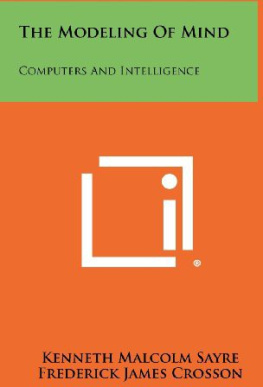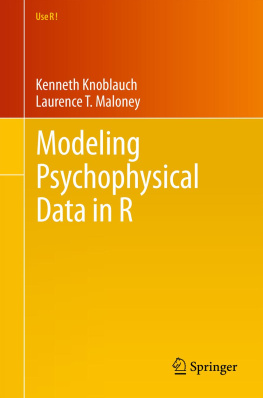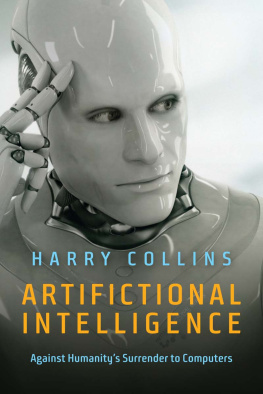Kenneth Malcolm Sayre - The Modeling Of Mind: Computers And Intelligence
Here you can read online Kenneth Malcolm Sayre - The Modeling Of Mind: Computers And Intelligence full text of the book (entire story) in english for free. Download pdf and epub, get meaning, cover and reviews about this ebook. year: 2012, publisher: Literary Licensing, LLC, genre: Science. Description of the work, (preface) as well as reviews are available. Best literature library LitArk.com created for fans of good reading and offers a wide selection of genres:
Romance novel
Science fiction
Adventure
Detective
Science
History
Home and family
Prose
Art
Politics
Computer
Non-fiction
Religion
Business
Children
Humor
Choose a favorite category and find really read worthwhile books. Enjoy immersion in the world of imagination, feel the emotions of the characters or learn something new for yourself, make an fascinating discovery.
- Book:The Modeling Of Mind: Computers And Intelligence
- Author:
- Publisher:Literary Licensing, LLC
- Genre:
- Year:2012
- Rating:4 / 5
- Favourites:Add to favourites
- Your mark:
- 80
- 1
- 2
- 3
- 4
- 5
The Modeling Of Mind: Computers And Intelligence: summary, description and annotation
We offer to read an annotation, description, summary or preface (depends on what the author of the book "The Modeling Of Mind: Computers And Intelligence" wrote himself). If you haven't found the necessary information about the book — write in the comments, we will try to find it.
The Modeling Of Mind: Computers And Intelligence — read online for free the complete book (whole text) full work
Below is the text of the book, divided by pages. System saving the place of the last page read, allows you to conveniently read the book "The Modeling Of Mind: Computers And Intelligence" online for free, without having to search again every time where you left off. Put a bookmark, and you can go to the page where you finished reading at any time.
Font size:
Interval:
Bookmark:
COMPUTERS AND INTELLIGENCE
EDITED BY Kenneth M. Sayre and Frederick J. Crosson
UNIVERSITY OF NOTRE DAME PRESS
-iii-
Copyright1963by
University of Notre Dame Press Notre Dame, Indiana
Library of Congress Catalog Card Number 63-19324Printed in the United States of America
-iv-
"Technological Models of the Nervous System", by A. Rapoport, reprinted by permission of the author and of the editor of Methodos.
"Experimental Music", by L. Hiller and L. Isaacson, reprinted by permission of the author and publisher from Experimental Music, by L. Hiller and L. Isaacson; copyright 1959, McGraw-Hill Book Company, Inc.
"The Chess Machine", by A. Newell, appearing originally as "The Chess Machine: An Example of Dealing with a Complex Task by Adaption", reprinted by permission of the author and of the editor of the Proceedings of the Western Joint Computer Conference.
"Towards Mechanical Mathematics", by H. Wang, reprinted by permission of the author and of the manager of Corporate Technical Publications of International Business Machines Corporation.
"Remarks on Mechanical Mathematics", by L. Wittgenstein, reprinted with permission of the publishers from Remarks on the Foundations of Mathematics by Ludwig Wittgenstein; first published in the United States in 1956 by the MacMillan Company.
"Sensation and Observation", by G. Ryle, reprinted from The Concept of Mind by permission of the author and of Barnes and Noble, Inc.
"Human and Mechanical Recognition", by K. Sayre, reprinted by permission of the author and the editor of Methodos.
"Stimulus Analysing Mechanisms", by N. Sutherland, reprinted by permission of the author and of the director of the National Physical Laboratory, Teddington, England.
"On the Conceptual Consciousness", by Aron Gurwitsch, reprinted by permission of the author, of the editor of Edmund Husserl 1859-1959 and
-v-
of Martinus Nijhoff, The Hague, and of the editor of Studies in Phenomenology and Psychology and of Northwestern University Press.
"Experience and the Perception of Pattern", by M. Polanyi, appearing originally as The Unaccountable Element in Science, reprinted by permission of the author and of the editor of Philosophy.
"Mindlike Behaviour in Artefacts", by D. MacKay, reprinted by permission of the author and of the editor of The British Journal for the Philosophy of Science and of Thomas Nelson and Sons, Ltd.
"The Mechanical Concept of Mind", by M. Scriven, reprinted by permission of the author and of the editor of Mind.
"Minds, Machines and Gdel", by J. Lucas, reprinted by permission of the author and of the editor of Philosophy.
-vi-
This book is designed to open a channel of communication between two groups of persons concerned with the impact of computer technology upon our conception of the human mind. As such, it should prove useful to students in either group. The two fields to which we refer may be described as (a) the philosophy of mental acts, and (b) the computer-oriented technology of the simulation of mental behavior. For convenience of reference, we will dub these two fields simply (a) "philosophy" and (b) "technology." While we have attempted to keep the needs of the classroom in mind while preparing this book, we have been equally interested in serving the person who is also an active contributor in one of these areas, and who feels that his understanding of his own particular problems might be increased by learning something of similar problems which researchers in other areas have encountered.
High-speed calculating machinery first came into the news shortly after World War II. By the end of the decade which followed, computers had proved their ability to relieve scientists and engineers of countless hours of drudgery in routine calculations. Applications were found for high-speed computers as well in the operations of government, business, industry, administration, and the military, and a brand-new technology began to take shape, self-consciously and soberly, under the title "Operations Research." Our concern in this volume is not with Operations Research, for which a number of in
-vii-
troductions already exist, but with another use of computers which is more provocative and considerably more speculative.
By the middle of the last decade, several research groups in the United States of America and in Europe had begun to experiment with computer systems which were intended to imitate behavior which a few years before generally would have been considered uniquely human. Computers were designed to play chess, compose music, write poetry, recognize letter-patterns in print and in script, and to do rather sophisticated problems in logic and mathematics. Success in these applications at first was quite modest. But as more and more time was spent in puzzling over the problems posed by these applications, and as more effective computers were brought into use, improved chess-playing, pattern-recognizing, and theorem-proving machines began to appear. Thousands of articles and reports were published about ways of doing these things just a little better, and hundreds of persons soon were occupied with reading and writing this literature and with performing expensive experiments on computers to add their own contribution to "the state of the art."
With the establishment of a distinct class of computer simulation experts, confidence in the machine's ability to take over many or most of man's mental functions hardened from merely a working hypothesis to an explicit article of faith. Appropriating the language of philosophical and experimental psychology, technologists began to speak of building machines which can recognize universals, of constructing machines which learn by organizing themselves in selective response to their environment, and of reproducing important functions of the human brain by networks composed of electronic rather than neurological elements. Reflecting this confidence on the layman's level, a rash of articles began to appear in the popular press which intimated that the day is not far off when almost anything we can do can be done better and faster by machines. It is not unusual today to encounter the presentment that humanity may soon have to face the choice between becoming mere servants within a society of mechanical brains, or of becoming extinct save perhaps for a few specimens of homo sapiens preserved in a museum to be studied by scholarly robots interested in natural history.
Apart from the question of the desirability of having such machines, it is not in fact established that these goals are capable of being realized. Centuries of philosophic debate on the problem of universals, on the operations of the intellect, and on the mind-body problem, testify forcefully that these problems are not so simple as to be solvable within a few years by investigators whose only advantage over their unsuccessful predecessors is to have available machines
-viii-
which operate more swiftly and efficiently than conventional engines of the past. Technologists cannot be justly censored for being ignorant of the problems encountered within traditional philosophical analyses of our mental behavior. But it is only professional prudence on the part of the technologist that he be concerned to find out what philosophers have said or might be able to say to clarify the task he has cut out for himself.
It is commonly conceded, indeed, that no pattern-recognition system yet devised performs nearly as well as its designers might desire, that existing chess-playing machines are not really very clever, and that mechanical compositions of music and poetry are far from being imaginative. What is not realized sufficiently often is that the reason for these relative failures may not be simply that the right combination of components and instruction has not been found, but rather that the very functions which the technologist is attempting to simulate are not themselves well understood. One principle of methodology, upon which philosophers and technologists should agree, is that a person does not have a very good chance of simulating behavior which he does not understand. And the fact of the matter is that no one, regardless of professional training, has an especially clear conception of what is involved in the function of pattern recognition, in artistic creation, or in the insightful decision-making exemplified in the behavior of even an amateur chess player. The attempt to understand behavior of this sort has been the occupation of philosophers for many centuries now, and contrary to the general opinion that there is no progress in philosophy, some of the more helpful analyses of behavior of this sort are found among recent philosophic publications. Since no one's conception of these functions is decisive, what insight the philosopher is able to offer to the simulation specialist, if it is offered humbly, might well be humbly received.
Font size:
Interval:
Bookmark:
Similar books «The Modeling Of Mind: Computers And Intelligence»
Look at similar books to The Modeling Of Mind: Computers And Intelligence. We have selected literature similar in name and meaning in the hope of providing readers with more options to find new, interesting, not yet read works.
Discussion, reviews of the book The Modeling Of Mind: Computers And Intelligence and just readers' own opinions. Leave your comments, write what you think about the work, its meaning or the main characters. Specify what exactly you liked and what you didn't like, and why you think so.











